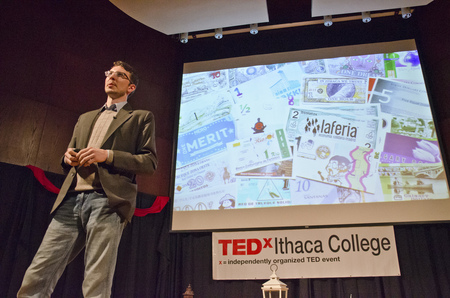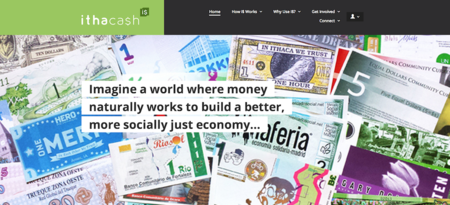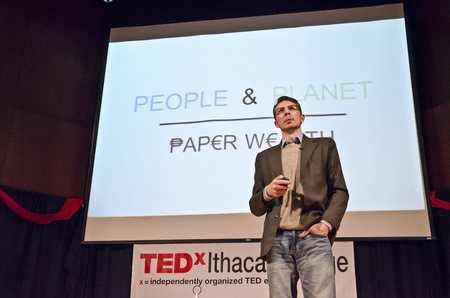Tech for Change: Scott Morris, Ithacash
 Don't miss the link to Scott's TEDxIthacaCollege talk, “Putting People and Planet Before Paper Wealth”, at the end of the interview!
Don't miss the link to Scott's TEDxIthacaCollege talk, “Putting People and Planet Before Paper Wealth”, at the end of the interview!
Singlebrook: Please give a brief overview of what Ithacash does.
Scott Morris: Ithacash is a new currency for in and around Ithaca, NY. It’s bought with the US dollar and backed by real goods and services in the community. What makes Ithacash different from other currency programs that have existed to-date is its strong social focus on benefiting the community, specifically around generating regional food security and helping those people who are being left out of the dollar economy.
SB: How did you come up with the idea for Ithacash?
SM: Ithacash as a concept arose out of some consulting that I did for the Ithaca Hours organization. That experience helped me realize my long term vision for AmeriQoin, a consulting business which helps existing and forming currency systems get off the ground and succeed. AmeriQoin is based on Qoin, a similar sort of organization in Amsterdam, with whom I became familiar with when I attended a “Conference on Complementary Currency Systems” in the Hague on their invitation.
Qoin has--what I believe to be--the best software in this space. It’s currently operating in the UK with the “Brixton Pounds” system, in Amsterdam using a social currency called the “Makkie”, and on TradeQoin, a business-to-business platform being supported through the EU-funded “Community Currencies in Action” project.
Though the idea was originally to bring the Qoin software to Ithaca Hours, when I presented that proposal, the Ithaca Hours board wasn’t interested. It was then that I sensed the opportunity to bring Ithacash out as an independent initiative. I believe that starting fresh will allow for more innovation and more impact in the community, and ultimately, it will be the community that decides what is or is not valuable.
Ithacash is a collection of best practices and policies from a number of different currency models around the world. The focus of Ithacash is on resolving wealth disparity by uplifting the poor and providing a mechanism for those with wealth to lend helping hands. Local currencies circulate at a much faster rate and can deliver benefits that are outside the capabilities of comparable dollar funding or donations.
 SB: How would one go about obtaining Ithacash?
SB: How would one go about obtaining Ithacash?
SM: Ithacash--alternately, “Ithaca Dollars” or “i$” for short--is for use in Ithaca and the surrounding communities. The i$ maintains a 1 to 1 relationship with the US dollar, keeping it simple for everyone.
The obvious way to get Ithacash is by buying some, or “converting” legal tender into local tender. When someone buys $100 worth of i$, Ithacash will generate and match that with another i$25 out of the system. The purchaser has the opportunity to donate that to a local cause, give it back to the system itself for use in discretionary funding, put it into the community grant pool, or keep it for themselves.
Ithacash grants will be available to the existing ecosystem of local nonprofits and causes, and donations for this purpose will be tax deductible! Other ways to get Ithacash include earning “Bounties” or “Bonuses” by serving the benefit of the system or of the community. Anyone, at any time, can engage, serve the community, and earn purchasing power without having to already have money or have a cause.
SB: What are some of the technology tools that have been most useful to you and your organization?
SM: The new website we’re working with is built on NationBuilder. They have received over $6MM in investment, and their offering has really rounded out! It has everything you need for managing a network around any kind of cause. A customer relationship management system, crowd funding platform, and billing system are all integrated in one place, and it makes it easy for me to track my contacts, web presence, and even fundraising. And now I’ve got a responsive website that I can maintain in-house.
What we have to look forward to in the future is Qoin’s platform, called QoinWare. QoinWare is an online and mobile platform that supports the use of the currency and makes payments. The exciting thing about this platform is that we’re going to be able to support text message-based payments. Anyone with any kind of cell phone linked to their account can send a text message and make a payment. This has caught on really strongly in Kenya and some other African countries and is starting to get attention in Europe and elsewhere. It’s very basic mobile money and can be a very powerful method for transacting.
Users will have a bank account, Paypal account, and an account on the Ithacash platform. Ithacash will debit the money from a Paypal account and credit the user’s Ithacash account. The text message payments are drawn on the Ithacash account and operate in parallel to the cash on the streets.
 SB: How have your cultural, educational and professional backgrounds prepared you to turn your ideas into reality?
SB: How have your cultural, educational and professional backgrounds prepared you to turn your ideas into reality?
SM: I grew up in Alabama, and until I moved to Toronto in middle school, my cultural exposure was rather limited. Living in Toronto really gave me a different perspective and informed me about how little I knew about the world. In college, I picked something that would fulfill that thirst for a greater context from which to put myself and our country. So I did international studies and I started studying Japanese. I spent a year in Japan, traveled through Southeast Asia and China on a backpacking trip, and ended up graduating with an interdisciplinary degree in political economics.
What I realized there, and through some political campaigning in 2007-2008, was that money is the factor that touches the greatest number of other factors besides humans themselves. Unfortunately, humans are lost in this maze of money, and that is posing a real threat. I asked, “What can be done about that?” I was motivated by fear, frankly. After the 2008 collapse, a lot of people were afraid of hyperinflation. The question that was dominating my mind was, “What would I do if all of my dollars were worthless tomorrow?”
When I moved to Iowa for graduate school, I determined that I would figure out this local money scene and learn how to make a local currency. We generated the “Hero Rewards” program where we issued a currency called the “Merit” to community volunteers for things like working in the community garden, weatherizing homes for the elderly, or running a zero waste public event on the Square. The local business community stepped in to acknowledge the value of these services, and users of the Merit had access to special deals called “Hero Rewards”.
After running our first pilot, we had the inspiration to create a cooperative governance model around it. That began our process of learning how to build a cooperative, then thinking about how we were going to build a business model. We presented it to some community members, got a little bit of seed investment, and were accepted into a business accelerator called Startup City Des Moines. Around that time, we were filmed to be in the movie “Money & Life”. It ended up being our second pilot, in Ames, Iowa, that was in the film.
Running those pilots really informed me around how much tolerance people had for alternative systems like these. It was amazing that, despite however many objections or reasons not to participate that people think of, once you start to dig a little deeper, a lot of people are really into what this stands for and the ways it helps them connect with the people and places that they really care about. That was a really satisfying experience.
I moved to Ithaca and have been working on this in one way or another for the past two years.
SB: What are a few of the biggest challenges you’re facing in launching Ithacash? How are you handling them?
SM: The critical distinction with local currency systems is the basis of the units. Meaning, “Are they time-based, are they connected to the dollar, or are they based on something else?” The challenges with a dollar-parity currency like Ithacash include everything that goes into designing the mechanisms that help it work and creating a model that’s focused on generating social and economic justice in the community.
SB: Who are the key sponsors and stakeholders involved? Local businesses?
SM: Yes. We have our fiscal sponsorship confirmed and will soon be able to take in donations on a tax-deductible basis. We’re launching a donations page to run a lightweight crowd funding campaign. That will parallel outreach to the business community, and that’s what I’ve been good at--getting out into the community and building networks from scratch. That means getting businesses on board, as well as other potential supporters, like The City of Ithaca, large institutions, realtors, and anyone with an interest in more local wealth and community well-being.
We will be opening up the conversation about how individuals can play a role in the launching of Ithacash. That could be by contributing time, money, professional services or other talents. We’re a system that is built on the principle of reciprocity, and we’re lucky in that the system provides a lot of flexibility in how to match value that comes our way.
 SB: What advice do you have for aspiring changemakers?
SB: What advice do you have for aspiring changemakers?
SM: If you are working on something that is genuinely good for the world and in service to the people and place that you live in, other people will be inspired by that and they will come running to help you make that happen! The value of selflessness and willingness to forego short-term benefits in favor of long-term outcomes cannot be overstated. Don’t be afraid to put yourself out there and meet people because people are always the primary resource. Listen to what people have to say and how they want to support you.
**
Everyone is very welcome to check out the talk I gave at TEDxIthacaCollege entitled “Putting People and Planet Before Paper Wealth” via www.ithacash.org/tedx. If you’re curious and would like to know more or perhaps even get involved, don’t be shy! We’re a growing team and are very excited for the future!
***
Singlebrook’s T4C campaign spotlights entrepreneurs and organizations that are using technology in unique ways to scale their ideas and create a massive impact. We are also creating our own high impact T4C projects. Check them out at: singlebrook.com/t4c. Share your stories of T4C or other inspirational resources and tips on Twitter (@Singlebrook) using #Tech4Change and on the T4C Facebook group, or contact us to be spotlighted in an upcoming feature interview or blog article!